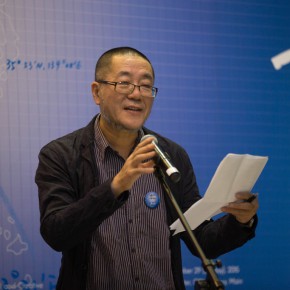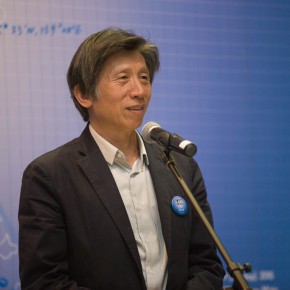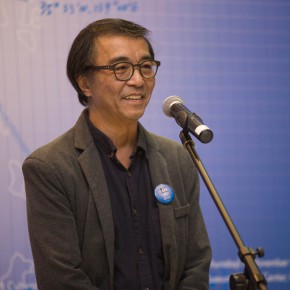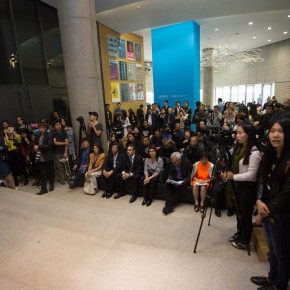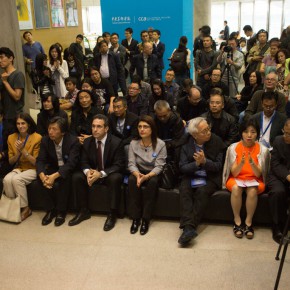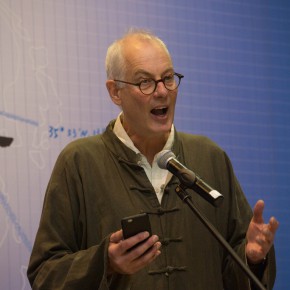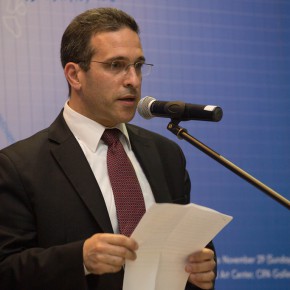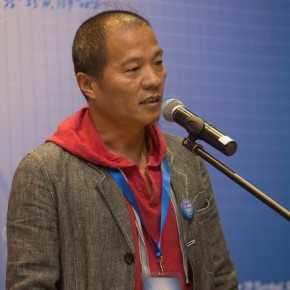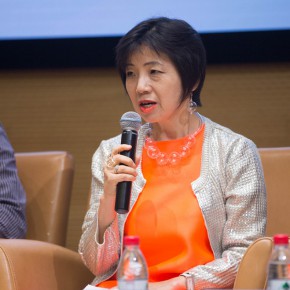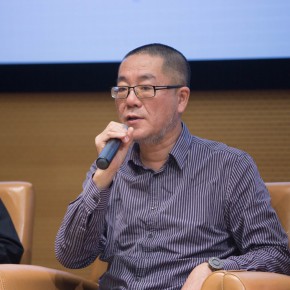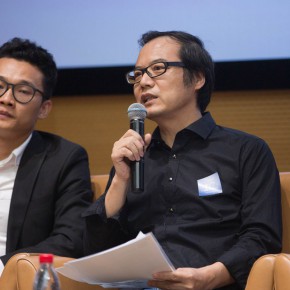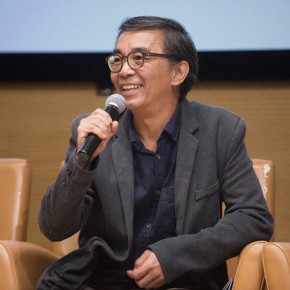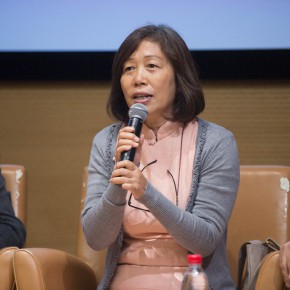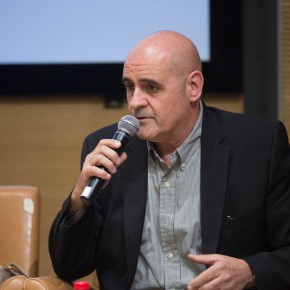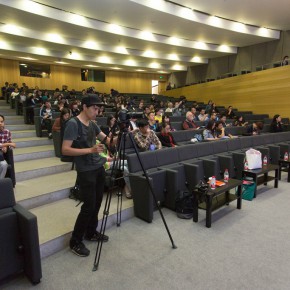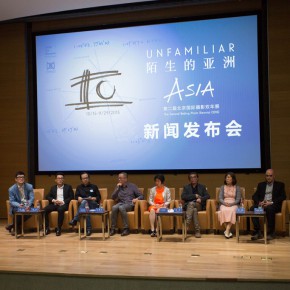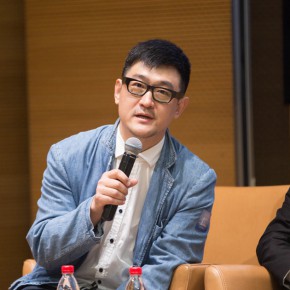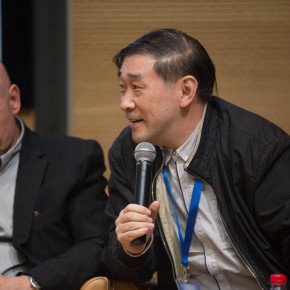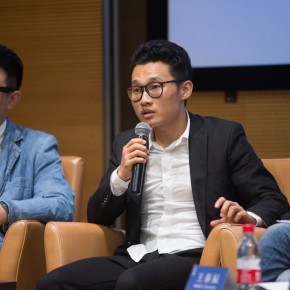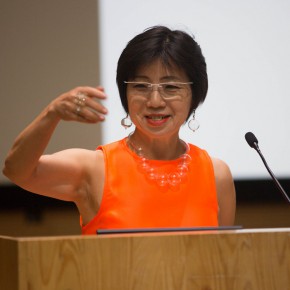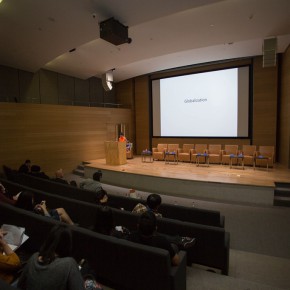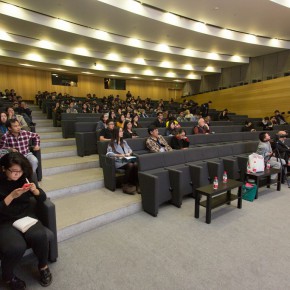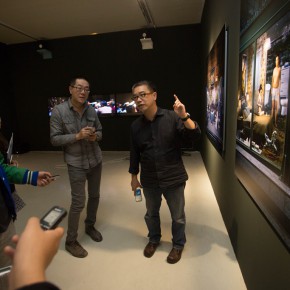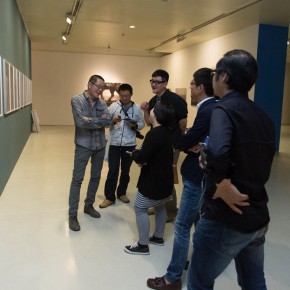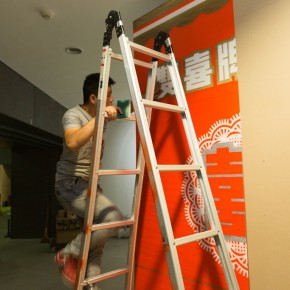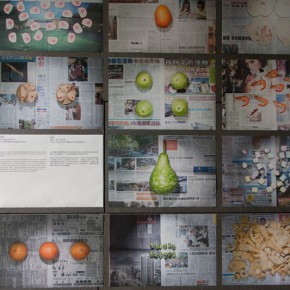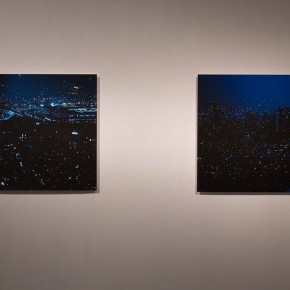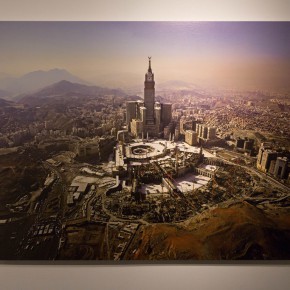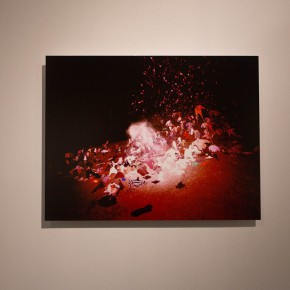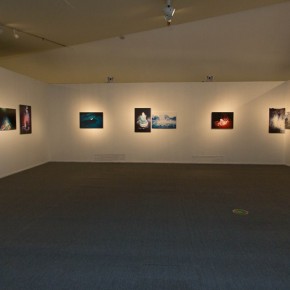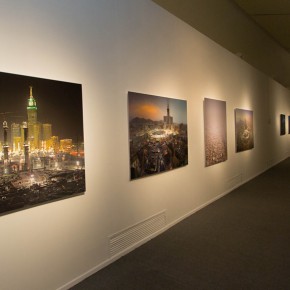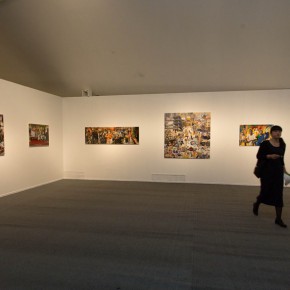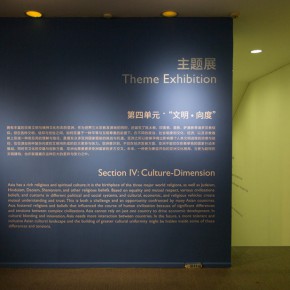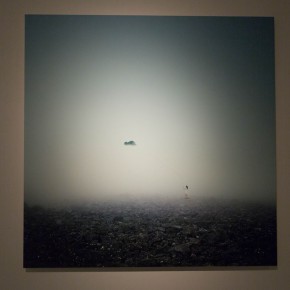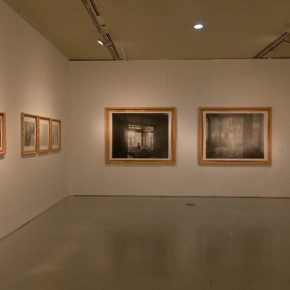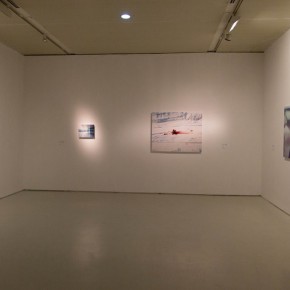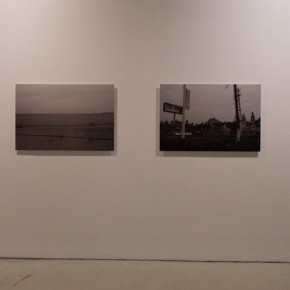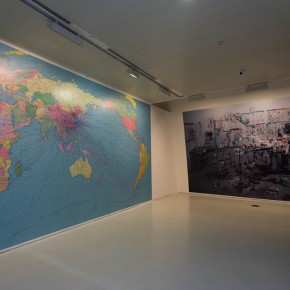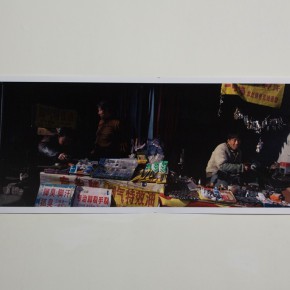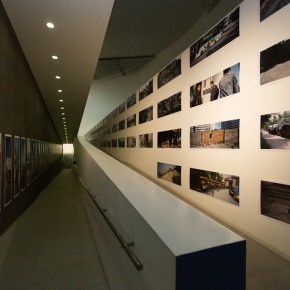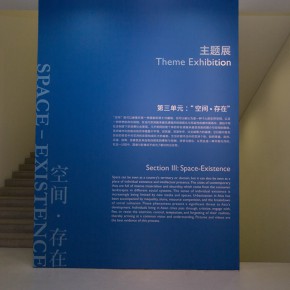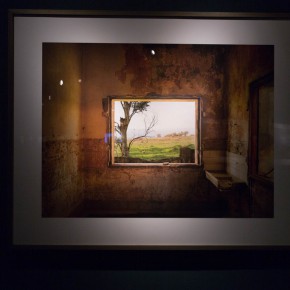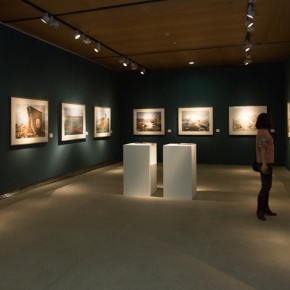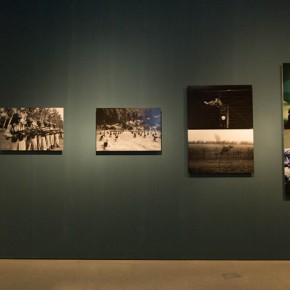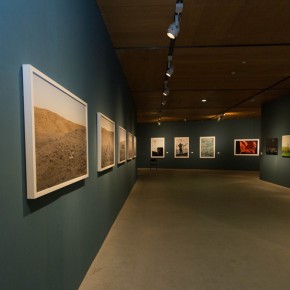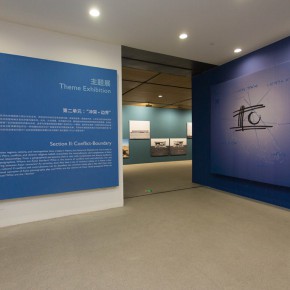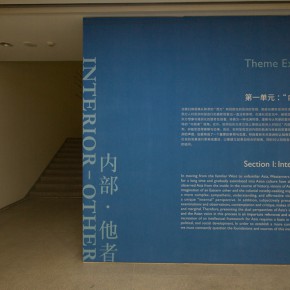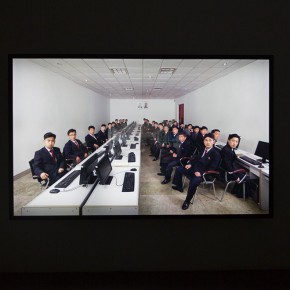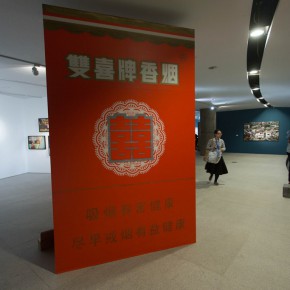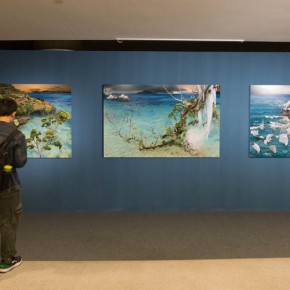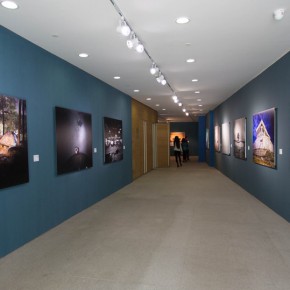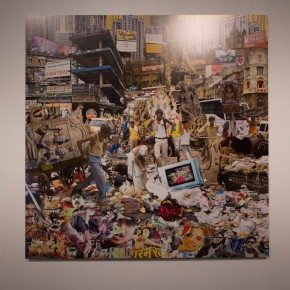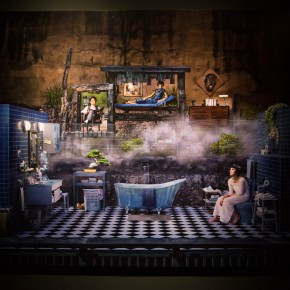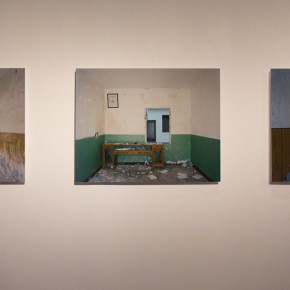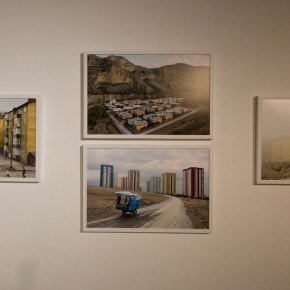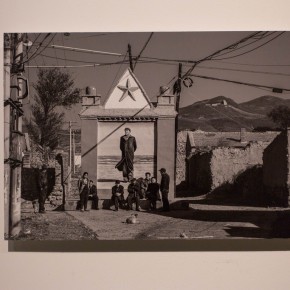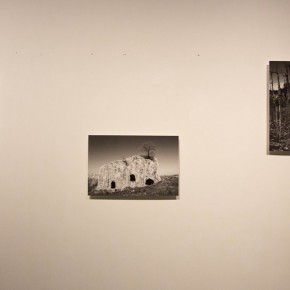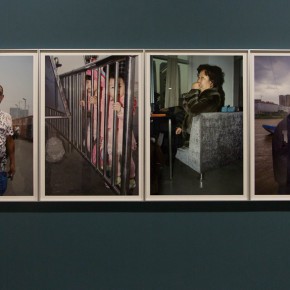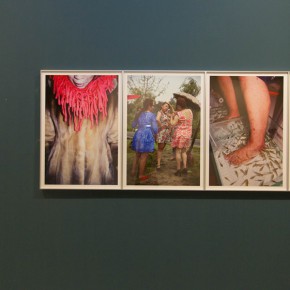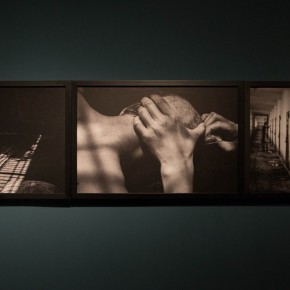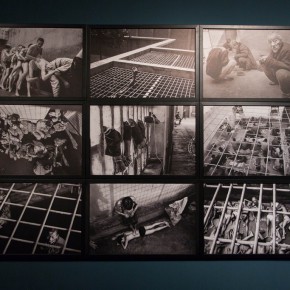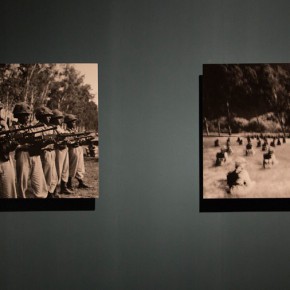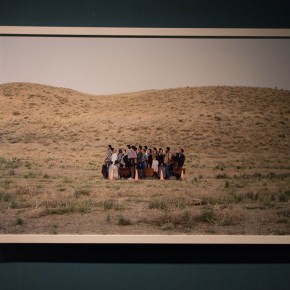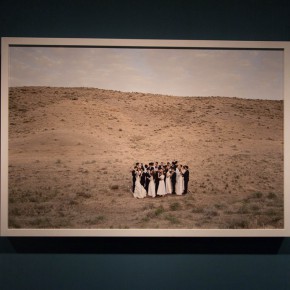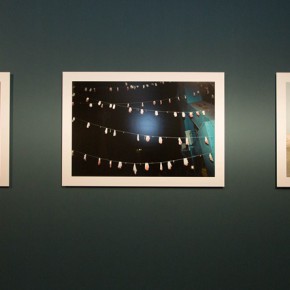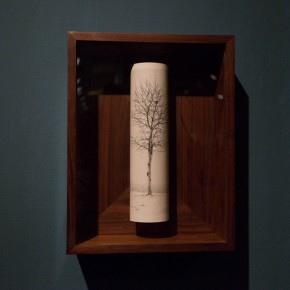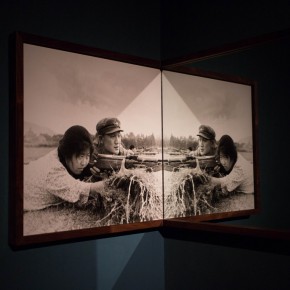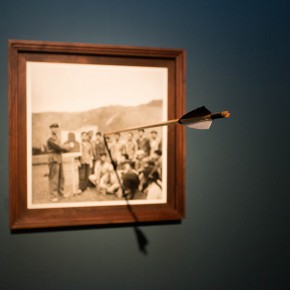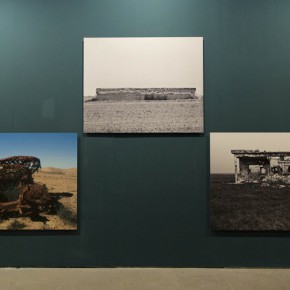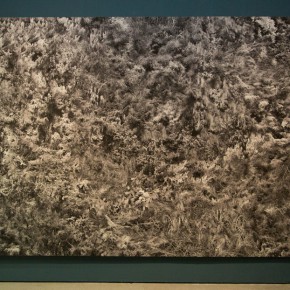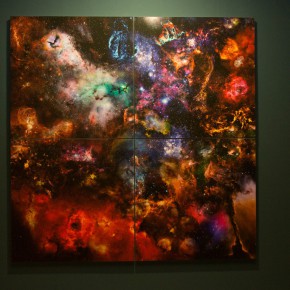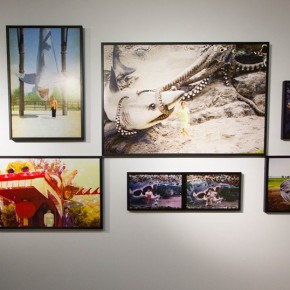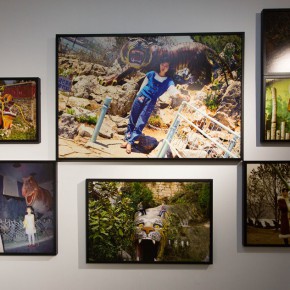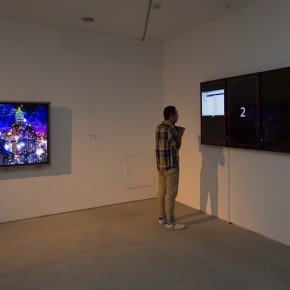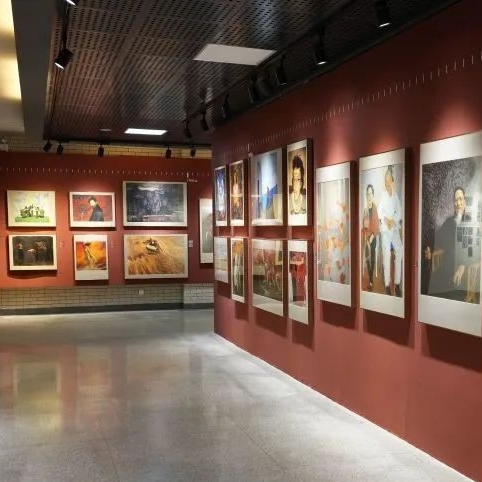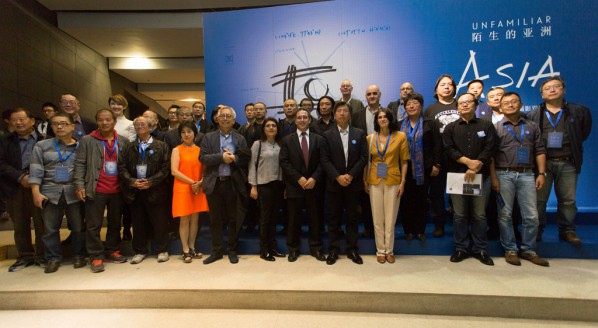
On the afternoon of October 15, 2015, “Unfamiliar Asia: The Second Beijing Photo Biennial (2015)” officially kicked off at CAFA Art Museum after eight months of preparation. The exhibition is divided into the 3 parts including Thematic Exhibition, Collection Exhibition and Photography Exhibition, while the Thematic Exhibition “Unfamiliar Asia” occupies the four floors of the exhibition space in the CAFAM, two collection exhibitions “Chinese Pictures: From the CAFAM Photography Collection”, “From Image to Photograph: Charles Jin’s Collection of Contemporary Chinese Photography” are on display in the 798 Art Zone and Caochangdi Art District at the same time, “Photography Book Exhibition: When Chinese Photography Publishing Encounters the West” will be on shown on the ground floor of the library of CAFA. The 4 exhibitions will last for a month and a half, going through to November 29.
The opening ceremony of the exhibition was held at CAFA Art Museum at 16:00. Honored guests attended the opening ceremony including the Deputy Ambassador and Minister of the Israeli Embassy to P.R.China Eldad Hayet, Cultural Counselor of Spanish Embassy to P.R.China Gloria Minguez, Director of the National Museum of India in New Delhi Sanjiv Mittal, President of CAFA Fan Di’an, Deputy Director of the National Art Museum of China An Yuanyuan, Vice President of CAFA Su Xinping, Director of the Art Museum of China National Academy of Painting Chen Fengxin, etc. and the leaders and professors of all the schools of CAFA, including Yin Jinan, Wang Min, Yu Ding, Lv Pinjing, Ma Gang, Wang Yingsheng, Jin Jun, Zhang Lujiang, Cao Qinghui, etc. attended the opening ceremony. In addition, Wang Yaning, a representative of the Chinese zone of German Hahnemühle Art Paper, the sponsor of the Second Beijing Photo Biennial (2015), Wu Hanlin, the technical director of German Hahnemühle Art Paper, the curatorial team of the Second Beijing Photo Biennial (2015) including Yuko Hasegawa, Nili Goren, Chun Wai, Tsai Meng, Duan Jun as well as the symposium moderator Wang Chunchen, curators of the first Beijing Photo Biennial Bastiaan Johannes Vroege, Rong Rong and Li Mei, as well as the artists of the exhibition, all attended the opening ceremony.
General adviser of the exhibition, President of CAFA Fan Di’an said that photography played a more and more important role in the contemporary visual culture, the exploration of the frontier issues such as the relationship between photography and art would be an ongoing academic proposition, the curatorial team of the photo biennale started a novel theme that was of a “sociological” meaning, to create an in-depth discussion and observation on the idea of photography, historical categorsation and Asian problems.
As one of the top international photo exhibitions in China, the “Beijing Photo Biennial” has been successfully held twice. At the press conference of the exhibition, Director Wang Huangsheng reviewed the exhibition theme and architecture of the previous one. “Problem consciousness” is always the style of the curatorial team of CAFAM led by Wang Huangsheng, from “Aura & Post Aura: The First Beijing Photo Biennial” which focused on photographic art in the digital age, to the 2nd biennial in a response to a larger category of “Asian question” in the form of art, the exhibition has always focused on how photography is a medium that is intervening, applying and continuously updating, constantly involved in the narrative of contemporary culture and the construction of a new artistic order and pattern.
The Second Beijing Photo Biennial (2015) will help people to understand the “rich but ambiguous Asian picture,” and Asia that has a long history and rich civilization, is currently experiencing a more complex and tortuous change, while it is forming a new geographical culture and the ethnic integration. The exhibition brings together 7 curators from Beijing, Hong Kong, Japan, Israel, through the photographic works selected and recommended by them, the viewers can know the fresher, richer and different side of Asia in terms of culture and spirit, from multiple dimensions and levels. Starting from the perspective of contemporary art and photography, either the “other imagination” in the West, or the “fuzzy self-identification” in the East, it actually continuously reveals the fact that we are very unfamiliar with Asia where we live in. The exhibition hopes through photographic characterization to see Asia, exploring the concept of “what is Asia”, and then to think about Asia, rediscovering Asia.
On the night before the exhibition, the curatorial team guided the media in visiting the exhibition and introduced the artists and works of the exhibition. The biennale presents more than 40 artists from 21 countries including China, India, Japan, Israel, Saudi Arabia, Iran, Syria, The Kyrgyz Republic, Bangladesh, Turkey, Iraq, Lebanon, the South Korea and so on.
The exhibition covers the 4 floors of the art museum, to present a macro and micro visiting context. The theme “Interior-Other” located on the ground floor covering several important artists of the exhibition, presenting the westerners who have lived in Asia for a long time and gradually assimilated into Asian culture photographing and observing Asia from the inside, showcasing the works by the 10 artists, including the international well-known Israeli artist Michal Rovner, the French artist Thomas Sauvin, Chinese artists Wang Guofeng, Weng Yunpeng, etc. At the exhibition “Conflict-Boundary” on the 2nd floor, 12 artists present together the Asia that is full of wars, conflicts, diverse religions, the contradictory and complex regional relationships. It includes Iranian artist Gohar Dashti, Bangladeshi artist Farzana Hossen, Chinese artists Miao Xiaochun, Cai Dongdong, etc. The 3rd floor “Space-Existence” focuses on the country, the individual, thoughts, as well as the living condition of people within the consumer landscape, presenting the works by 14 artists, including Chinese Wang Qingsong, Rong Rong & Inri, Feng Li, German artist Casten Schael, etc. the 4th floor exhibition hall “Culture-Dimension”, the 7 artists showcase the Asia that has a rich religious civilization and spiritual culture. The representatives of the artists are Japanese artist Lieko Shiga, Chinese artist Wang Chuan, Singaporean artists Zhao Feng + Lin Huiyi and so on.
In addition to the rich thematic exhibition, collection exhibitions, photography book exhibition, the biennale will also hold a series of rich academic activities and public programmed series, academic activities are divided into three parts: first “Asian Wisdom” symposium. It is unfolded around the theme of the exhibition, photography and Asia, interior observations, the Asian photography system and other issues; at the same time, based on the works of the artists it invites the curators and artists of the key foreign art institutions to have a discussion; secondly, “Conversations on Asia” series of lectures. The art museum invites the domestic experts and scholars that specialize in the study of Asian problems, to have an in-depth exchange and wide discussion around the current Asian cultural, political and economic hot issues; thirdly, “looking back on Asia” series lectures. This exhibition will invite the domestic experts who study Asian-Pacific history, to carry out a series of lectures and dialogues on the topic of “on Asian history”, to combine theoretical research and the thoughts on practice.
Text by Zhu Li, Photo by Yang Yanyuan/CAFA ART INFO
Translated by Chen Peihua and edited by Sue/CAFA ART INFO
This Biennial is divided into a theme exhibition, a collection exhibition and a photo book exhibition. The theme exhibition is “Unfamiliar Asia,” featuring photographers from 21 countries, including China, India, Japan, Israel, Saudi Arabia, Iran, Syria, Kyrgyzstan, Bangladesh, Turkey, Iraq, Lebanon, and South Korea. There are two collections exhibitions. ”Pictures of China: From the CAFAM Photography Collection” will be exhibited at 798 Art Center. “From Pictures to Photographs: The Contemporary Photography Collection of Jin Hongwei” will be exhibited at CIPA Gallery in the Caochangdi Art District. The photo book exhibition will feature outstanding photo books from around the world (including independent publications and handmade books). The show attempts to present photography publications that have reached a certain standard in terms of photography, editing, innovation, design, printing, and production techniques in contemporary photography.
Academic Activities
There are three parts to the “Unfamiliar Asia” series of academic activities. The Asian Thought Forum will center on the exhibition theme, photography and Asia, internal others (ways of seeing), and the Asian photography system. A group of important foreign museum curators and artists will engage in a discussion based on the works in the exhibition. For the Conversations on Asia lecture series, we will invite Chinese scholars and experts on Asian issues to engage in broad explorations and deep discussions of current Asian cultural, political, and economic topics. The Looking Back on Asia series will feature Chinese experts on the history of the Asia-Pacific region. They will give talks and engage in discussions on the topic of Asian history, combining theoretical research and practical investigation.
During the Second Beijing Photo Biennial, the CAFA Art Museum and Three Shadows Photography Art Centre will jointly organize an international forum entitled “Oracle Photo: International Photo Curators.” This popular event will draw curators and managers from more than one hundred art museums, photography museums, publishing houses, and other art institutions. Last year, the CAFA Art Museum was named the host of the Oracle Forum. During the Second Biennial, some VIPs be invited to participate in the academic events related to exhibition. During Oracle, Three Shadows will host an exhibition of original photography entitled “Photography after the End of the Twentieth Century,” which will interact with the exhibitions in the Biennial.
Public Events
In order to increase public participation in the Biennial and interact more with viewers, the organizers have planned a series of public events related to “Unfamiliar Asia.” These events can be divided into three categories: online events, children’s programs, and photography laboratories.
I. Online Events
The online events will launch before the exhibition opens. As a crowd-sourcing program, participants can send messages on crowd-sourcing sites, Douban, and other social media platforms to promote the exhibitions. At the exhibition opening, the results will be presented in the public education section.
1. Creating an “Unfamiliar Self”
Using selfies and airbrushing software, people tell their stories and seek out different selves. Using the CAFA Art Museum microblog and WeChat platforms, we will conduct an open call for images and present the images online. The general public can then vote on the images and the winners will receive prizes. (There are 100 prizes, with a special first prize of a camera or mobile phone.)
2. Collecting photographs focusing on “Familiar Asia” and “Fresh Asia.”
For example, the general public can upload pictures taken in countries across Asia using online media such as microblogs, WeChat, andDouban, or seek out different aspects of Asia photographed by other people.
II. Children’s Programs
Based on the map of Asia, art objects (for children and adults) will be used to create large outdoor collages. Children are welcome to participate in four large collages located in the museum’s sunken courtyard and the CAFA campus, the 798 Art District, the Caochangdi Art District, and Fangcaodi.
III. Photography Laboratory
Artists showing in the exhibition will be invited to participate in the photography laboratory. The artists will interact with the general public, sharing their ideas and experiences of photography and their understandings of Asian identity. A photography laboratory will also be provided for a special group, who will come to re-understand themselves and society through photography.
1. Two Japanese artists and two Chinese artists will conduct a workshop on the theme “Unfamiliar Asia.”
2. An Israeli artist will conduct a workshop on the theme “Unfamiliar Asia.”
Publications
In addition to a brochure and a leaflet, we plan to publish two books: The Second Beijing Photo Biennial Catalog and The Papers of the Second Beijing Photo Biennial.
1. The Second Beijing Photo Biennial Catalog will present curators’ essays, artists’ works, and summaries of the forums, dialogues, and academic activities.
2. The Papers of the Second Beijing Photo Biennial will feature the papers presented during the seminars.
Schedule
October 15, 14:00- After the press conference, Yuko HASEGAWA will give a talk.
October 15, 17:00- Opening
October 16, 9:30-16:00- Asian Thought Forum
October 16, 16:00- All VIPs and participating artists will travel to Three Shadows for the opening of “Photography after the End of the Twentieth Century.”
October 17, 9:30-15:00- Artist dialogues
In addition, during the first two weeks of the exhibition, CAFA Art Museum will host three editions of the “Conversations on Asia” lecture series. The organizers will invite several experts on Asia to discuss “On Asian Issues”(Schedule TBA). We will also host the “Looking Back on Asia” lecture series, which will feature Chinese experts on the history of the Asia-Pacific region or officials from the Ministry of Culture or the Ministry of Foreign Affairs discussing Asian history (Schedule TBA).
Contact Information
E-mail: photobiennial@163.com
Address: CAFA Art Museum, No. 8 Huajiadi South Street, Chaoyang District, Beijing, China 100102
Fax: +86-1064771699
Website: http://www.cafamuseum.org
Microblog: http://weibo.com/cafamuseum
Appendix 1. Curatorial Team
WANG Huangsheng (China)
Wang Huangsheng is a doctor of art history, a professor at the Central Academy of Fine Arts, a doctoral adviser, director of the CAFA Art Museum, a council member of the China Artists Association, the deputy director of the Committee of Art Museums in China, and a member of the National Contemporary Art Research Centre Expert Committee at the Ministry of Culture. Wang is an art expert who receives a special allowance from the State Council.
In 2004, he received the Medal for Art and Literature given by the French government. In 2006, he received the Chivalric Honor awarded by the President of Italy. In 2013, he received the Best Beijing Educator Award from the Beijing city government. He has founded and organized the Guangzhou Triennial, the Guangzhou Photo Biennale, the CAFAM Biennale, the CAFAM•Future Exhibition, and the Beijing Photo Biennial. He has curated exhibitions such as “A Documentary Exhibition of the Art of Mao Zedong’s Era (1942-1976)” and “Humanism in China: A Contemporary Record of Photography.” He was the director of the Guangdong Museum of Art from 2000 to 2009.
Yuko HASEGAWA (Japan)
Yuko Hasegawa is Chief Curator of the Museum of Contemporary Art, Tokyo (MOT) and Professor of the Department of Art Science, Tama Art University in Tokyo. Since 2008, Yuko has been a member of the Asian Art Council at the Solomon R. Guggenheim Museum (New York). She will be a curator for “New Sensorium in Infosphere -Exit from Failture of Modernism” to be held at ZKM | Center for Art and Media Karlsruhe, Germany in April, 2016. She is Artistic Director of Inujima Art House Project (2011-present) and Curator for Art Basel in Hong Kong Encounters (2012-2014). Her recent projects include “BUNNY SMACH – design to touch the world” (2013) at Museum of Contemporary Art Tokyo, and “Trans Cool Tokyo” (2010-2011) at Singapore Art Museum. At the 21st Century Museum of Contemporary Art, Kanazawa where she was appointed as Founding Artistic Director, she curated “Matthew Barney: Drawing Restraint” (2005). She was Curator of 11th Sharjah Biennial (2013), Artistic Advisor of 12th Venice Architectural Biennale (2010), Co-Curator of 29th São Paulo Biennial (2010), Commissioner of Japanese Pavilion of 50th Venice Biennale (2003), Co-Curator of the 4th Shanghai Biennale (2002) and Artistic Director of the 7th International Istanbul Biennial (2001). Her publications include ‘Modern Women: Women Artists at the Museum of Modern Art,Museum of Modern Art, 2010, pp334-351 and ‘Kazuyo Sejima + Ryue Nishizawa: SANAA,’Phaidon Press, 2006.
Nili GOREN (Israel)
Nili Goren was born in 1965 in Jerusalem, Israel. From 1986-1990, she undertook a BFA at the photography department of Bezalel Academy of Art and Design in Jerusalem, and from 1991-1994 Nili gained an MFA in Art History at Tel Aviv University.
Nili taught critical theory in art and photography in various institutions including Bezalel Academy of Art and Design, Jerusalem, from 2000-2004, and since 1999 she has been the Curator of Photography at Tel Aviv Museum of Art. Nili has curated over 30 exhibitions, including: David Claerbout: "the time that remains" (2012); Jeff Wall: "Visibility" (2013); and many more.
Selected essays written and published by Nili Goren:
Nili Goren, "Circles: The Flâneur’s Return is Also His Departure", in Professor Mordechai Omer (ed.) Ori Gersht : Afterglow, exh. cat. (Published by August / Tel Aviv Museum of Art, London / Tel Aviv, 2002);Nili Goren, "RealityTrauma: Circles of Validity and Meaning", in Nii Goren (ed.) Avi Ganor: RealityTrauma, exh. cat. (Tel Aviv Museum of Art, Tel Aviv, 2011);Nili Goren, "Post on Pop", in DPC Advertising (eds.) David La Chapelle: Lost and Found, exh. cat. (Pavleye Art and Culture, Prague, 2011).
CHUN Wai (Hong Kong)
Chun Wai is a curator, artist, and the course coordinator and lecturer for the Postgraduate Diploma in Photography at the Hong Kong University SPACE. He is based in Hong Kong, his motherland.
He earned the Diplôme national supérieur d'expression plastique (DNSEP), an advanced diploma in visual arts, from the Ministry of Culture in France. He subsequently opened his own studio in France and pursued art that integrated the essence of Western contemporary art into traditional Chinese aesthetics.
When Chun returned to Hong Kong in 1993, he taught in an art college and then worked as a photojournalist.
In 2011, Chun established Health in Action, an international NGO, to promote humanitarian services in Asian countries. In 2012, he was appointed academic committee member of the Dali International Photo Festival. In 2014, Chun was invited to be a portfolio reviewer at Encuentros Abiertos: Festival de la Luz and the Lianzhou International Photo Festival.
Recently, he curated “Latin American Contemporary Photography,” “The North: Photography from the Belfast School of Art at Ulster University,” and “Hong Kong Photography in the 1960s” at the Dali International Photography Festival (2015). He also curated “The Voice of Tacitness: The Second Asian Female Photography Exhibition” at the Hong Kong International Photo Festival” (2014), “Yuen Yeung: An Avant-Garde Photography Exhibition by Seven Hong Kong Artists” at the Lianzhou International Photo Festival (2013), and “The Voice of Tacitness: The First Asian Female Photography Exhibition” at the Dali International Photo Festival (2013).
He received the Curatorial Award given by the Chinese Photographers Association (2013), the Redpoll Trophy Best Publication given by the Fourth Dali International Photography Exhibition (2012), and the Human Rights Press Awards 2010: Photo Journalism Feature (PRIZE) given by the Foreign Correspondent’s Club in Hong Kong, the Hong Kong Journalists Association, and Amnesty International Hong Kong (2011).
WANG Chunchen (China)
Wang Chunchen is a doctor of art history, head of the Curatorial Research Department at the CAFA Art Museum. In 2013, he was appointed the curator of the China Pavilion at the 55th Venice Biennale.
Wang has also greatly influenced Chinese contemporary art criticism through his translations of a dozen volumes on art history and theory, such as After the End of Art (Arthur C. Danto) and Art Since 1940. In 2009, he received the Critic Award at the China Contemporary Art Awards and published Art Intervenes in Art. He also published books including The Democracy of Art and The Politics of Images. He has curated numerous notable shows, including The First CAFAM Biennale “Super-Organism: Research and Experiment from a Specific View,” The First CAFAM•Future Exhibition “Sub-Phenomena: Report on the State of Young Chinese Art,” “Conceptual Renewal: A Brief History of Chinese Contemporary Photography,” “Transfiguration: The Presence of Chinese Artistic Methods in Venice,” and “Future Returns: Contemporary Art from China.”
TSAI Meng (China)
Born in 1978, Tsai Meng is a doctor of art history and an associate professor at the Central Academy of Fine Arts. He currently works in the Curatorial Research Department at CAFA Art Museum.
He previously worked at the Photography Department at the Chinese National Academy of Arts and he was the photography project director at the Guangdong Museum of Art. He has curated exhibitions and biennales including the Guangzhou Photo Biennial (2009), “Spectacle and Gaze: An Exhibition of Contemporary Photography in China” (2009), The First CAFAM•Future Exhibition “Sub-Phenomena: Report on the State of Young Chinese Art” (2012), “Chinese Contemporary Photography 2009-2014” (2014), The Second CAFAM•Future Exhibition “Observer-Creator: The Reality Representation of Chinese Young Art” (2015), and “Naturalism and Images of the Mind: Works of the Photography Master Harry Callahan” (2015).
DUAN Jun (China)
Duan Jun is a Chinese art critic and curator. He received his doctorate from the Art History and Theory Department at Tsinghua University. Previously, he served as the deputy director of the White Box Art Museum in Beijing. Currently, he is teaching in the Art Theory Department at the Beijing Institute of Technology. Duan participated in the Chinese Fine Arts Critics Annual Conference from 2007 to 2014. He is a member of the Chinese Fine Arts Critics Annual Conference Organizing Committee.
Duan Jun has curated exhibitions including “Magnanimity: Collection of Atypical Works by 21 Chinese Artists,” “Dark Energy: Qin Ga,” “Tenth of a Second: Fen and Ma Liuming,” and “Drilling Wood for Water: Song Yonghong.” He also co-curated “Three Worlds Away: Conceptual Absolutism” and planned a seminar entitled “Frontiers in Criticism and Theory: Thirty Years of Chinese Performance Art.” He has given lectures and participated in seminars on the characteristics of Chinese contemporary art, new art media in the last twenty years, Chinese contemporary painting from 2000 to 2010, the material discourse and rhetorical transformation of Chinese contemporary art, Ma Liuming and 1990s performance art in China, and ancient Chinese portraits and physiognomy at art institutions such as the Suzhou Art Museum and Offenbach Art University.
Appendix 2. Oracle
Similar to other art genres, the field of photography consists of an extremely complex system of occupational division (e.g. artists, curators, historians, photography journalists, and publishers). Thus, how to establish an efficient system using resources that can be rationally distributed has become a crucial issue in the field of photography. In order to address this issue, Jim Enyeart and Nathan Lyons organized the first Oracle forum at the Center for Creative Photography at the University of Arizona in 1983. At the forum, more than twenty specialists discussed how to effectively share and utilize resources. The forum has attracted a large number of attendants every year since its inception.
The Oracle does not have permanent employees or office space. The forum is organized by different institutions in different countries around the world. From 1983 to today, the Oracle has been hosted thirty-one times in fifteen countries in Europe, Asia, and Latin America. The number of attendants has also increased from about twenty to over one hundred.
At the forum, attendants discuss and vote on the most important issue facing the field. This issue can involve photography theory, curating strategies, collaboration, publication, history, literature management, collection, preservation and protection, education, fundraising, or other themes. Other activities, such as public lectures and visits to local tourist attractions and art museums and institutions, are also organized by the host institution.
Oracle normally lasts two and a half to four days, and the Post-Oracle (which consists of more activities arranged by the host organization) lasts two to three days.
About the Biennial
Theme
Chinese: 陌生的亚洲:第二届北京国际摄影双年展(2015年)
English: Unfamiliar Asia: The Second Beijing Photo Biennial (2015)
Organizer: CAFA Art Museum
Co-Sponsor: Beijing 798 Cultural and Creative Industry Investment Co., Ltd.
Dates: October 15(Thursday) to November 29, 2015 (Sunday)
Opening: October 15, 2015 (Thursday), 5:00 PM
Venues: CAFA Art Museum, 798 Art Center, CIPA Gallery
General Adviser: FAN Di’an
Art Director: WANG Huangsheng
Curators: Yuko HASEGAWA / Nili GOREN / CHUN Wai / WANG Chunchen / TSAI Meng / DUAN Jun
Symposium Moderator: WANG Chunchen
Unfamiliar Asia: The Second Beijing Photo Biennial (2015)
The Schedule of Academic Activities
I. “Asian Wisdom” Symposium
Time: October 16-17, 2015
Venue: CAFA Art Museum
Organized by Central Academy of Fine Arts, Beijing, CAFA Art Museum
Co-organized by National Institute of International Strategy, Chinese Academy of Social Sciences (NISS, CASS)
October 16 09:30—12:00
Theme: Unfamiliar Asia
Moderator: Wang Chunchen (Head of curatorial dept, CAFA Art Museum)
09:30-10:00 Welcome speech:
Welcome speech by Fan Di’an, president of CAFA
Welcome speech by Wang Huangsheng, director of CAFA Art Museum
Welcome speech by Li Wen, Vice-director of NISS, CASS
10:00-10:40 Keynote speech:
10:00-10:20 Li Wen, Vice-director of NISS, CASS
10:20-10:40 Gu Zheng (Counselor of the Second Beijing Photo Biennial,
Well-known Photography theorist, Curator)
10:40-11:30 Group discussions:
Li Wen, Gu Zheng, Liu Xiangcheng (Counselor of the Second Beijing Photo Biennial, Well-known Photographer), Takashi Honma(Japanese Artist), Sputniko!(Japanese Artist), Miao Xiaochun (Chinese Artist), Wang Chuan (Chinese Artist)
11:30-12:00 Q&A(speakers and audience)
October 16 12:00—13:30 Lunch
October 16 14:00—16:00
Theme: Asia In Art
Moderator: Tsai Meng (Associate Professor, Curatorial Dept, CAFA Art Museum)
14:00-14:20 Keynote speech:
Speaker:
Chun Wai (Independent curator, Artist, Lecturer of The University of Hong Kong)
14:20-14:50 Artists Speech(10 mins per person):
Gilad Ophir (Israel)
Stefen Chow (Malaysia)
Chou Ching-hui(Taiwan, China)
14:50-15:30 Group discussions:
Yuko Hasegawa (Chief Curator of the Museum of Contemporary Art, Tokyo), Chun Wai, Gilad Ophir, Stefen Chow, Chou Ching-hui
15:30-16:00 Q&A(speakers and audience)
16:00 All VIPs will travel to CIPA Gallery and Three Shadows
Photography Art Center in Caochangdi Art District
October 17 09:30—12:00
Theme: Regionalism and Unfamiliarity in Asia
Moderator: Chun Wai
09:30-09:50 Keynote speech:
Speaker: Wang Min’an (Counselor of the Second Beijing Photo Biennial, Professor of institute of literature, Captial Normal University)
09:50-10:30 Artists Speech (10 mins per person):
Carsten Schael (German)
Gu Wenjia (China)
Niu Guozheng (China)
Guo Guozhu (China)
10:30-10:50 Rest Time
10:50-11:40 Group discussions:
Wang Min’an, Oh Yong-Min (Lecturer of School of Humanities,CAFA), Carsten Schael, Gu Wenjia, Niu Guozheng, Guo Guozhu
11:40-12:00 Q&A(speakers and audience)
October 17 12:00—13:30 Lunch
October 17 14:00—17:00
Theme: A Different Asia and Possibility
Moderator: Duan Jun (Art Critic, Curator, Teacher of Beijing Institute of Technology)
14:00-15:10 Artists Speech(10 mins per person):
Shai Kremer(Israel)
Boaz Aharonovitch(Israel)
Wang Qingsong(China)
Liu Xiaofang(China)
Yang Yueluan(China)
Zhou Mingying(China)
Zheng Chao(China)
15:10-15:30 Rest Time
15:30-16:30 Group discussions:
Shai Kremer, Boaz Aharonovitch, Liu Xiaofang, Yang Yueluan, Zhou Mingying, Zheng Chao
16:30-17:00 Q&A(speakers and audience)
II. “Conversations on Asia” Series Lectures
Lecture One: Identity and Alienation of East Asia
Speaker: Zhang Yunling (Professor, NISS, CASS)
Time: 2:30-4:30pm, October 23, 2015
Venue: CAFA Art Museum
Lecture Two: Incredible India
Speaker: Liu Jian (Professor, NISS, CASS)
Time: 2:30-4:30pm, October 30, 2015
Venue: CAFA Art Museum
Lecture Three: Korea - Resonate with Me
Speaker: Dong Xiangrong (Professor, NISS, CASS)
Time: 2:30-4:30pm, November 6, 2015
Venue: CAFA Art Museum
III. “Looking Back on Asia” Series Lectures
Lecture One: A Different Central Asia
Speaker: Sun Zhuangzhi (Professor and Vice-director, Institute of Sociology, CASS)
Time: 2:30-4:30pm, November 13, 2015
Venue: CAFA Art Museum
Lecture Two: Turkey - A Country with Mystery
Speaker: Zan Tao (Vice Director of Department of History, Peking University )
Time: 2:30-4:30pm, November 20, 2015
Venue: CAFA Art Museum
Lecture Three: The Far-away Middle East
Speaker: Yin Gang (Professor, Institute of West Asian and African Studies, CASS)
Time: 2:30-4:30pm, November 27, 2015
Venue: CAFA Art Museum
Courtesy of the artists and CAFA Art Museum.



